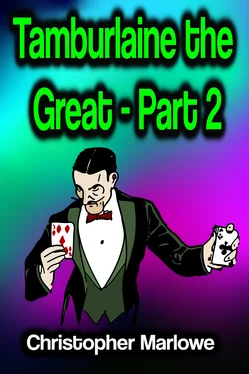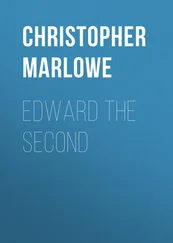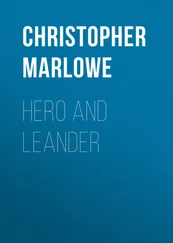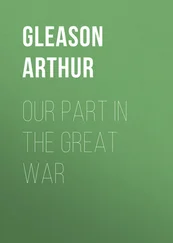ORCANES. Now lie the Christians bathing in their bloods,
And Christ or Mahomet hath been my friend.
GAZELLUS. See, here the perjur'd traitor Hungary,
Bloody and breathless for his villany!
ORCANES. Now shall his barbarous body be a prey
To beasts and fowls, and all the winds shall breathe,
Through shady leaves of every senseless tree,
Murmurs and hisses for his heinous sin.
Now scalds his soul in the Tartarian streams,
And feeds upon the baneful tree of hell,
That Zoacum, 77 that fruit of bitterness,
That in the midst of fire is ingraff'd,
Yet flourisheth, as Flora in her pride,
With apples like the heads of damned fiends.
The devils there, in chains of quenchless flame,
Shall lead his soul, through Orcus' burning gulf,
]From pain to pain, whose change shall never end.
What say'st thou yet, Gazellus, to his foil,
Which we referr'd to justice of his Christ
And to his power, which here appears as full
As rays of Cynthia to the clearest sight?
GAZELLUS. 'Tis but the fortune of the wars, my lord,
Whose power is often prov'd a miracle.
ORCANES. Yet in my thoughts shall Christ be honoured,
Not doing Mahomet an 78 injury,
Whose power had share in this our victory;
And, since this miscreant hath disgrac'd his faith,
And died a traitor both to heaven and earth,
We will both watch and ward shall keep his trunk 79 Amidst these plains for fowls to prey upon.
Go, Uribassa, give 80 it straight in charge.
URIBASSA. I will, my lord.
[Exit.]
ORCANES. And now, Gazellus, let us haste and meet
Our army, and our brother[s] of Jerusalem,
Of Soria, 81 Trebizon, and Amasia,
And happily, with full Natolian bowls
Of Greekish wine, now let us celebrate
Our happy conquest and his angry fate.
[Exeunt.]
Конец ознакомительного фрагмента.
Текст предоставлен ООО «ЛитРес».
Прочитайте эту книгу целиком, купив полную легальную версию на ЛитРес.
Безопасно оплатить книгу можно банковской картой Visa, MasterCard, Maestro, со счета мобильного телефона, с платежного терминала, в салоне МТС или Связной, через PayPal, WebMoney, Яндекс.Деньги, QIWI Кошелек, бонусными картами или другим удобным Вам способом.












